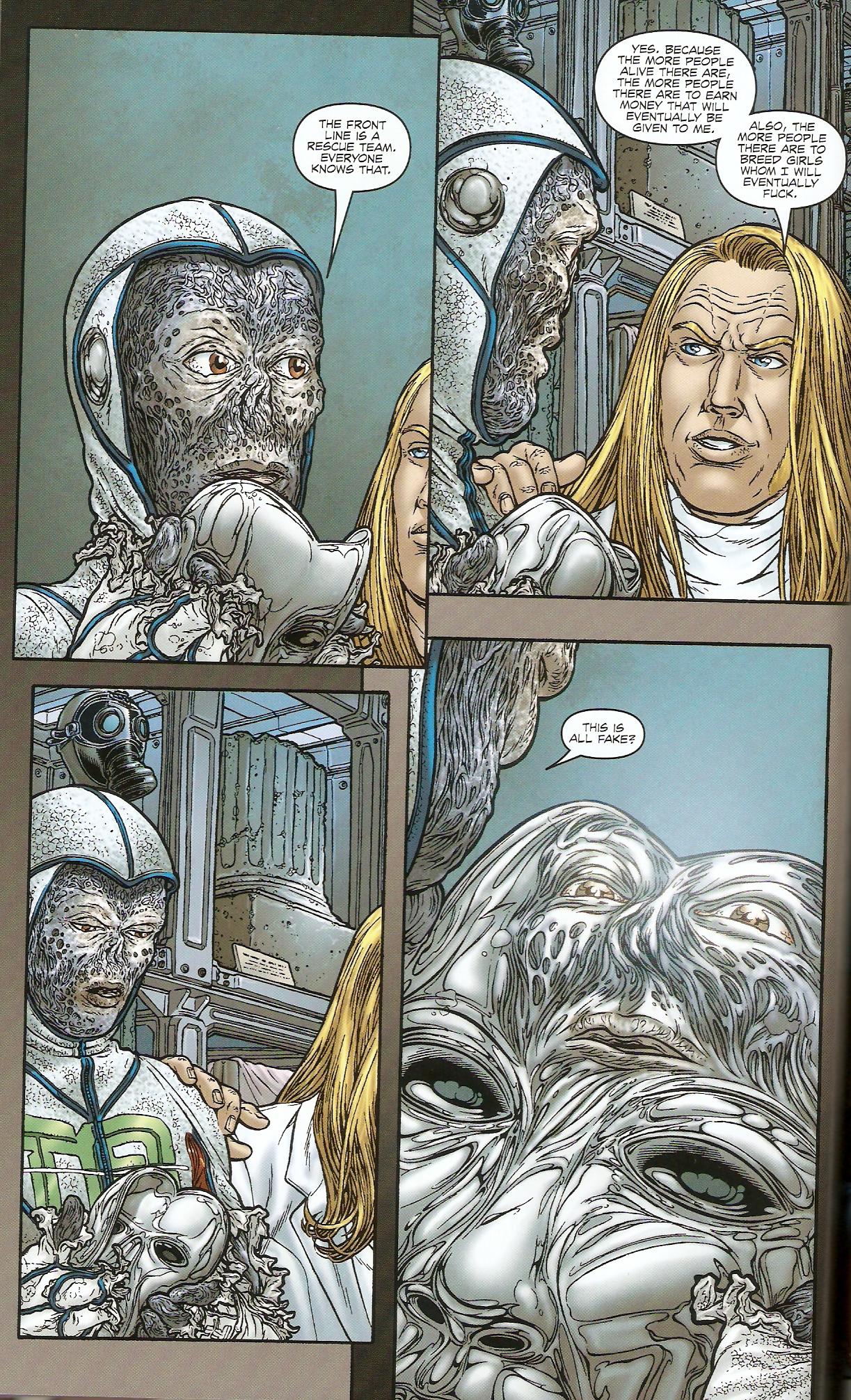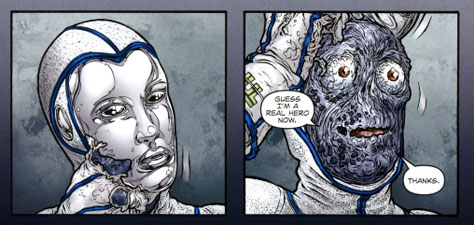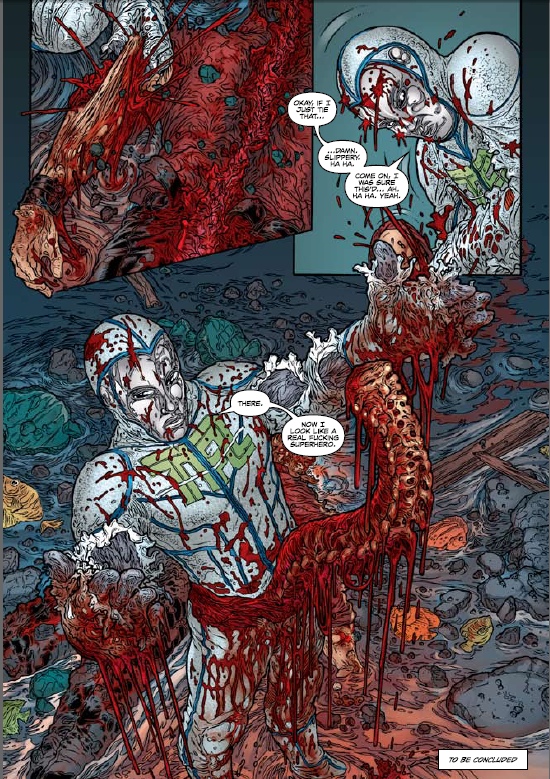Many writers have, “that story”; the one where superheroes are taken to their logical conclusion in an orgy of tyranny and blood. Alan Moore did it in, “Miracleman/Marvelman,” Mark Millar has done it to varying degrees in, “The Authority,” and, “The Ultimates,” Frank Miller with, “The Dark Knight,” and the list goes on. “No Hero,” by Warren Ellis and Juan Jose Ryp is another take on this concept — with sexual dysfunction thrown in.
“No Hero,” was a mini-series published by Avatar comics and collected as both a trade and hardcover. It is set in an alternate universe where the world was exactly like ours until June 6th, 1966, when a man named Carrick Masterson announced he had created super humans through his discovery of a drug called FX7. The series is mostly set in the alternate present, and focuses on a superhero organization organized by Carrick called Frontline, made up of people who have taken the drug.
As the series begins, Frontline is in trouble; the heroes are getting killed off in oddly precise ways despite it supposedly being incredibly hard to kill them. To replenish their ranks, Frontline approaches a young vigilante named Joshua Carver. Carver takes the pill that makes him a hero — and at this point we get some of the most bizarre imagery ever put to paper in a superhero comic courtesy of artist Juan Jose Ryp who is really a beautiful illustrator (good enough that Marvel comics snatched him up to pencil a quite dreadful Wolverine comic).
 Carver’s transformation leaves him a hideous mess. His skin is falling off to be replaced by some hard purple material and he’s become, “castrated.” Another hero named Ben/Redglare tries to comfort him but Carver starts to freak out and break everything before realizing he can do so because he has powers at which point he’s…happy. Either Carver was so desperate to achieve his ideal of a hero he was willing to sacrifice a huge aspect of it, or something else is up.
Carver’s transformation leaves him a hideous mess. His skin is falling off to be replaced by some hard purple material and he’s become, “castrated.” Another hero named Ben/Redglare tries to comfort him but Carver starts to freak out and break everything before realizing he can do so because he has powers at which point he’s…happy. Either Carver was so desperate to achieve his ideal of a hero he was willing to sacrifice a huge aspect of it, or something else is up.
After rescuing people from a plane crash Carver is let in on the big secret, Frontline orchestrates a lot of problems and runs the world. Carrick admits that, “It does people good to have super-powered heroes. It makes them think they’re incapable of doing anything for themselves. That forms the basis of a society that’s useful to me. Yes Joshua, we do save people. It’s good for business.” For Ellis, a world with heroes is one where some jerks who are more powerful than us run everything.
It turns out that Joshua was a plant via the US Government, and he is working with a bunch of other world agencies to take out Carrick. In depicting the conflict, the comic becomes the most gory thing I have ever read. Perhaps the high point (or low point?) of the carnage is when Joshua literally rips a man apart, takes his spine, and wears it like a strap-on penis, declaring, “Now I look like a real fucking superhero.”
We learn later on that Carver had parents who were murdered by a serial killer and he was raised by this killer before the FBI found him and made him their own personal monster used to catch other monsters. Carver became a deformed and hideous creature because FX7 shows what is inside you, and what was inside him was hideous. His serial killer father “father” was someone who did terrible sexual things to him and this resulted in Carver being incredibly sexual dysfunctional—why would he want a penis when he saw one used to do so much harm?
The advertising tagline to “No Hero” asked “How much do you want to be a super human?” The phrasing is telling; “super human”, not “super hero.” The characters here aren’t heroes. In fact, Ellis pretty much concludes that only the completely fucked up would want to be superheroes in the first place. It isn’t that super powers corrupt; it’s that only the corrupted want super powers.
The super-hero as a representation is a male ideal; strong and muscular, able to beat up the villain and save the woman all by the end of the issue (or in this era of decompressed comics, multi-issue story-arc). Yes, there are some female heroes and this formula gets switched up, but you can still look at many heroes as the perfect man—strong, smart, and able to save the day.
In some contexts (like James Bond, for example) the perfect man would have perfect bits, enabling a perfect series (and perhaps even a perfect storm) of sexual conquest . But American comics has a strangely stunted development when it comes to sexuality —its perfectly fine to show as much violence as you want, but dare show an exposed breast and you’re looking at a Marvel Max rating or Vertigo label.
In “No Hero,” Ellis suggests that the sexlessness of the super-hero is a feature, not a bug. To want to be a super-hero is to want to gain powers…and to lose your penis. Superheroes — and those who want to be superheroes — replace their sex with violence.



So superheroes are a male power fantasy and if you want to be one you have to stop identifying as a male?